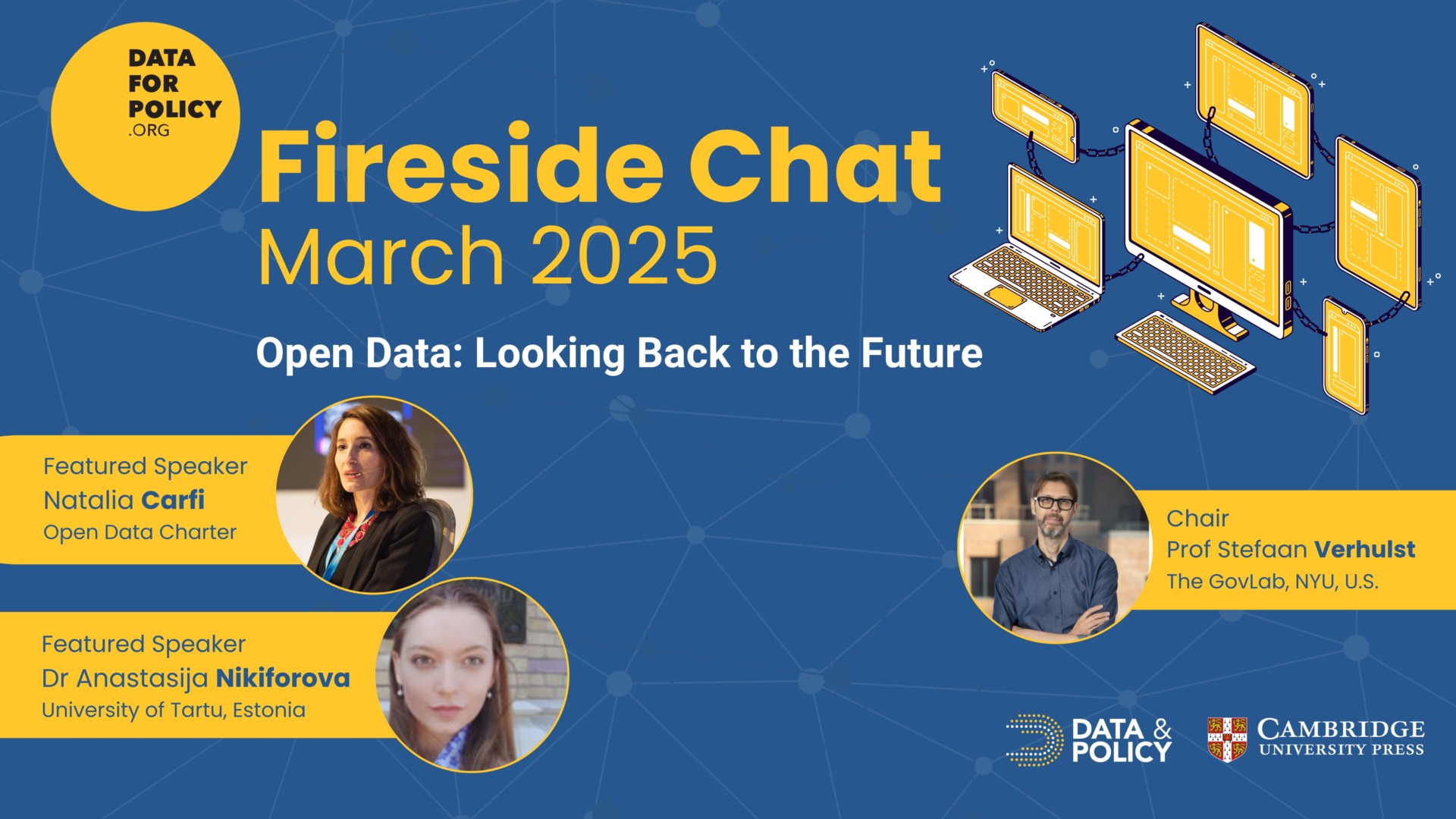On 26 March 2025, the Data for Policy community gathered for the fifth session of our Fireside Chat series, featuring Dr Anastasija Nikiforova from University of Tartu Institute of Computer Science and Natalia Carfi, the Executive Director of the Open Data Charter. The discussion was chaired by Professor Stefaan Verhulst, Co-founder of The GovLab and The Data Tank, and Co-Editor-in-Chief of the Data & Policy journal.
The discussion focused on the evolution of open data, tracing its development from early freedom of information movements to the rise of open government data initiatives. The speakers reflected on the major milestones in open data policy and explored current challenges in ensuring accessibility, usability, and trust in public data initiatives. They also examined the future trajectory of open data, emphasising the role of governance frameworks and international collaboration in fostering transparency and innovation, including the introduction of open data charters, legislative frameworks, and the increasing role of civil society and academia in shaping data-sharing practices. They examined the successes and setbacks of these initiatives, identifying gaps in implementation and the need for more inclusive data governance models.
A key part of the discussion addressed the contemporary challenges facing open data efforts. Our speakers highlighted issues such as data quality, interoperability, sustainability, and the risks associated with data misuse. They also explored how policymakers, technologists, and civil society actors can work together to develop ethical and practical solutions that enhance accessibility, usability, and public trust in open data ecosystems.
Looking to the future, the speakers considered the impact of emerging technologies, such as AI-driven data analysis and blockchain for data verification, on the open data landscape. They emphasised the importance of global cooperation and robust governance structures in ensuring that open data continues to serve the public interest while mitigating risks related to privacy, misinformation, and power asymmetries.
Key Takeaways
- Rethinking Open Data: The speakers reflected on 15 years of progress in open data governance, highlighting advancements in transparency and interoperability while emphasising ongoing challenges like data silos and regulatory inconsistencies. They stressed the importance of cross-sector collaboration to sustain open data as a public good.
- Beyond Structured Data: Open data is no longer limited to tabular datasets—new formats like audio, video, and 3D data are emerging. While these alternative data types expand usability, they also introduce technical and ethical challenges, requiring new frameworks for management and standardisation.
- Synthetic Data: Complement or Competitor? Our speakers debated whether synthetic data could replace open data, given its advantages in privacy protection and secure data-sharing. While synthetic data mitigates privacy risks, concerns remain about its reliability and potential biases. The consensus? Synthetic data should complement—not replace—open data, with a focus on transparency and trust.
- Business Models for Open Data: Sustainable public-private partnerships are essential for scaling open data initiatives. The discussion explored policy incentives and funding models that encourage private sector engagement, showcasing case studies from governments worldwide.
- The Role of Governments in DPI: Governments play a critical role in advancing open data and digital public infrastructure (DPI) by setting standards, ensuring interoperability, and fostering trust among stakeholders. The session highlighted successful government-led initiatives that have expanded public data access while maintaining safeguards.
- Aligning DPI with User Needs: Digital public infrastructure must be designed for inclusivity and accessibility. The speakers discussed the need for user-centred design, emphasising the value of community engagement in making data-driven solutions more effective and equitable.
- The Future of Open Data: The session concluded with insights on how emerging technologies and global policy efforts could shape the next phase of open data governance. Topics included the role of AI in automating data analysis, the potential of blockchain for enhancing data integrity, and the need for cross-sectoral collaboration to develop sustainable and fair open data frameworks.
To gain deeper insights from the experts and hear the full discussion on the future of open data, watch the full session here.
What’s Next?
The Fireside Chat series continues next month, bringing together leading experts to explore pressing issues in data governance, AI policy, and emerging technologies. Stay tuned for updates on our upcoming sessions by subscribing to our newsletter.

